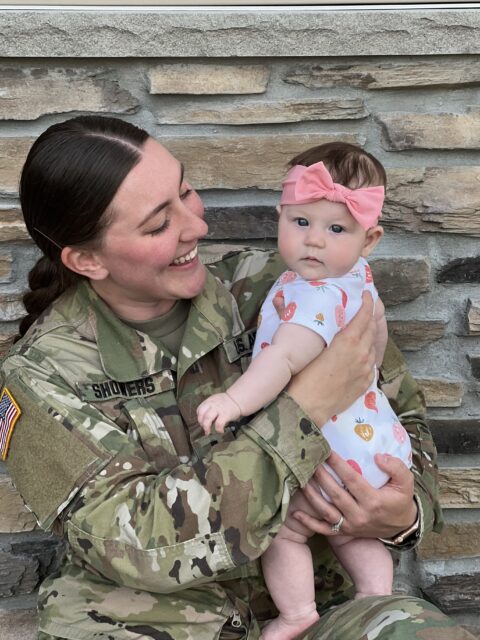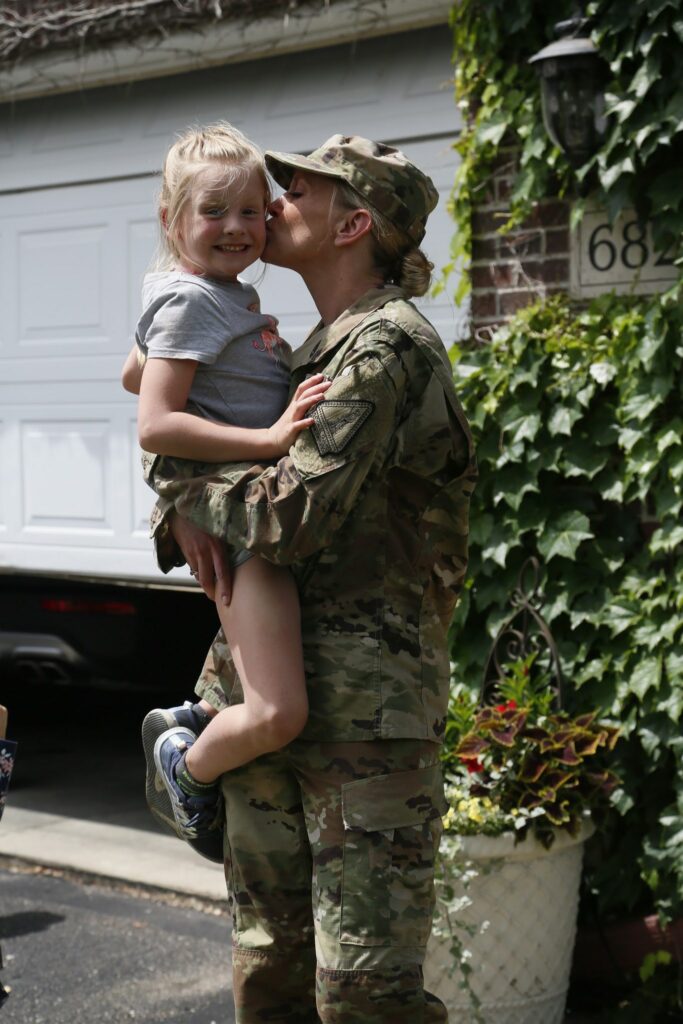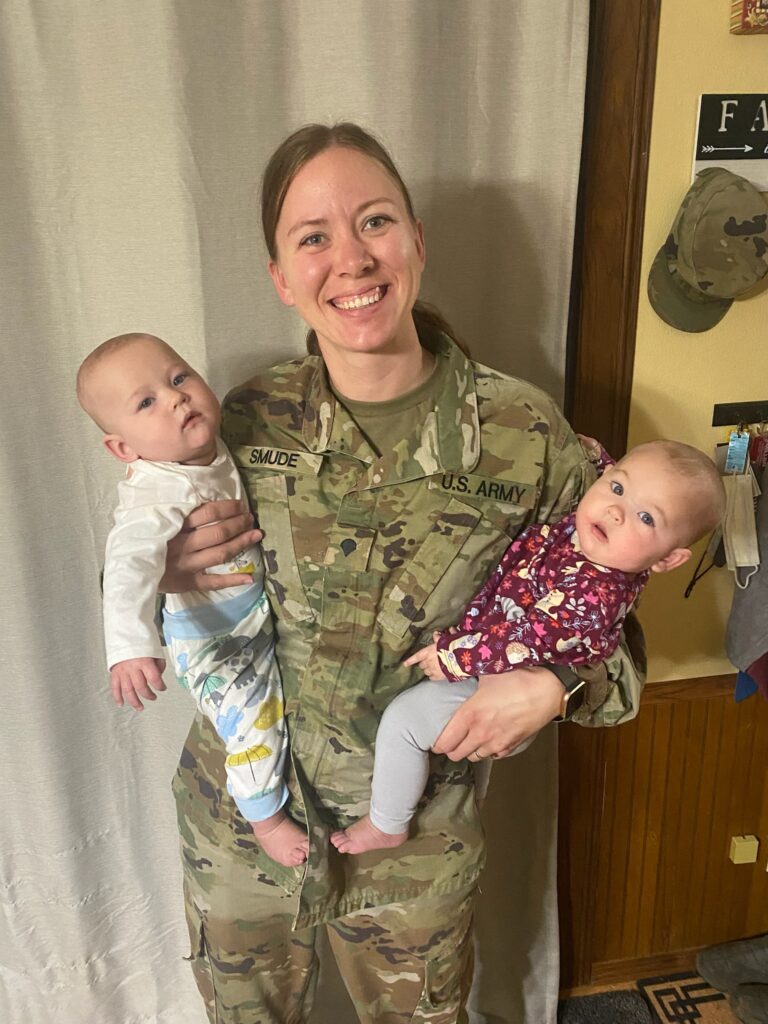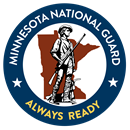Minnesota National Guard continues support of postpartum parents

“As leaders, we talk about putting people first because our service members, employees, and their families deserve to work and live in safe, healthy environments where everyone is treated with dignity and respect,” said Army Capt. Andrea Drost, the full-time administrative officer for the Minnesota National Guard’s 1st Armored Brigade Combat Team, 34th Infantry Division. “Supporting mothers through their transition back to work is not only taking care of our current force, but it’s imperative to retaining women in our formation.”
As of June 2022, the U.S. Army published an update to their 2020 directive regarding Parenthood, Pregnancy and Postpartum (Army Directive 2022-06). The new directive contains six new components – five of which were suggested from Soldier feedback. Whereas the first draft of the policy placed much of the responsibility on service members to initiate communication and management, the updated policy increases the resources for service members as well as the flexibility regarding the length of time allowed to return to regular duty standards. Some of the most significant policy changes and program improvements, include expanding postpartum operational and training deferments, extending exemptions for physical fitness testing and the Army Body Composition Program, standardizing convalescent leave in cases of miscarriage, allowing attendance for select military courses while pregnant, and increasing family care plan flexibility. The regulations on breastfeeding standards and conditions also received a significant overhaul that came from direct input from service members.
Drost’s family life and career path have led her to have two daughters 9 years apart, thus she has experienced returning to work both before and after the policy.
“With my first daughter, I pumped wherever I could find privacy as there weren’t dedicated spaces available,” explained Drost. “I often used the break room, but that was problematic as people would try to open the door to get to the refrigerator or microwave. At Camp Ripley, I pumped in mop closets and open bays as needed. At ranges, I’d utilize the cab of an [Light Medium Tactical Vehicle] parked away from people as much as possible or I’d use a [personal vehicle] if someone had one available. The lack of designated space made pumping more difficult than it needed to be.”
Under the new Minnesota National Guard policy, guidelines are laid out more clearly and specifically for both commanders, supervisors, service members, and civilian employees to understand. Whereas the 2020 policy encouraged mothers to express milk during lunch and authorized breaks for a “reasonable time” with a 2-to-3-hour reference, the 2022 policy emphasizes the fact that all bodies are different and that lactating service members and employees should take breaks as needed for as long as needed.
“In my opinion, I should have the right to be able to pump as much as I need to,” said Spc. Tina Smude, a mother of three who recently returned to her full-time position as a production controller at Camp Ripley’s Collective Maintenance Area. “If you have integrity and are pumping when you say you are, you should be able to pump however long is needed.”
The original policy laid out specific requirements for commanders, supervisors, and units to provide dedicated lactation rooms in all armories and training facilities. These requirements are carried on in the 2022 federal policy, yet Minnesota adds in the availability of field nursing kits that can be checked out by nursing service members in the event of field training exercises. These field nursing kits contain a portable refrigerator, power inverter, extension cable, cleaning wipes, sealable bags, and markers, all contained in a standard issued assault pack. While the field kits have been available to service members for nearly two years, utilization has been low possibly due to a lack of knowledge about the kits’ existence. To reserve a field nursing kit for annual training or an exercise, service members can simply request one through their unit’s supply sergeant, who will then submit the reservation request to Camp Ripley Supply and Services.
Additionally, if an employee’s position requires travel, the updated policy provides reimbursement for supplies to ship breast milk to their home of record.
While the Minnesota National Guard has had a breastfeeding and lactation support policy since 2018, there is always room for improvement and better communication between commanders, supervisors, new mothers, and fellow service members.
“The main issue that I have faced is the negative connotation around pumping on duty,” said Army 1st Lt. Dana Showers, a traditional, drilling Soldier with the 334th Brigade Engineer Battalion and first-time mom with a five-month-old daughter. “My command team is very supportive of me having to step out of meetings or be late to meetings and training, but I feel that there is a lack of education and support from other Soldiers. The lack of empathy, driven by the lack of understanding of the policy, can break down working relationships.”
The Minnesota National Guard encourages all service members and civilian employees to have a positive, accepting attitude towards working women and breastfeeding. As this new policy comes into practice, leaders and peers should know the policy requirements and safeguards to support the Airmen, Soldiers, and civilian employees it applies to – regardless of their dependent status. A junior service member might not know that they are entitled to a dedicated nursing room or have the option to check out nursing kits at Camp Ripley, like Drost 9 years ago.


“With my first daughter, I faced challenges with having the confidence to advocate for myself when needed,” said Drost, who previously served as a junior enlisted service member before becoming a commissioned officer. “There were several times where I was uncomfortable and didn’t know who to ask for help.”
Clear communication both up and down the chain of command puts action behind the Minnesota National Guard’s people first priority and ensures the safeguarding of basic service member and employee care rights.
“This policy allows me to have peace of mind, knowing that I am able to provide nutrition for my daughter while still serving my country,” said Showers. “If the Minnesota National Guard can ensure proactive support of new mothers with this policy at all leadership levels, it can retain Soldiers that will continue to advance the strength of the force for years to come.”
With 91 Minnesota National Guard service members currently on active pregnancy profiles or postpartum profiles and even more families trying to conceive or adopt, the impact of this new Parenthood, Pregnancy and Postpartum policy will have positive ripple effects for years to come.
More information on the Army Directive 2022-06 (Parenthood, Pregnancy and Postpartum) can be found at Army Publishing Directorate at: https://armypubs.army.mil/ProductMaps/PubForm/ArmyDir.aspx
Staff Sgt. Sydney Mariette
Minnesota National Guard Public Affairs


